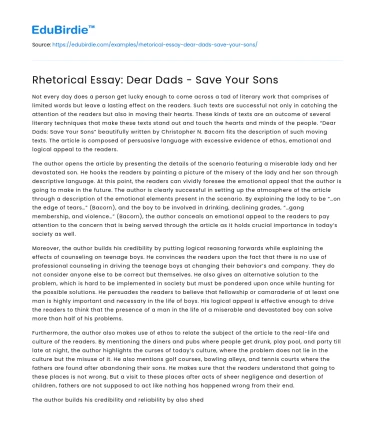Not every day does a person get lucky enough to come across a tad of literary work that comprises of limited words but leave a lasting effect on the readers. Such texts are successful not only in catching the attention of the readers but also in moving their hearts. These kinds of texts are an outcome of several literary techniques that make these texts stand out and touch the hearts and minds of the people. “Dear Dads: Save Your Sons” beautifully written by Christopher N. Bacorn fits the description of such moving texts. The article is composed of persuasive language with excessive evidence of ethos, emotional and logical appeal to the readers.
The author opens the article by presenting the details of the scenario featuring a miserable lady and her devastated son. He hooks the readers by painting a picture of the misery of the lady and her son through descriptive language. At this point, the readers can vividly foresee the emotional appeal that the author is going to make in the future. The author is clearly successful in setting up the atmosphere of the article through a description of the emotional elements present in the scenario. By explaining the lady to be “…on the edge of tears…” (Bacorn), and the boy to be involved in drinking, declining grades, “…gang membership, and violence…” (Bacorn), the author conceals an emotional appeal to the readers to pay attention to the concern that is being served through the article as it holds crucial importance in today’s society as well.
Save your time!
We can take care of your essay
- Proper editing and formatting
- Free revision, title page, and bibliography
- Flexible prices and money-back guarantee
Moreover, the author builds his credibility by putting logical reasoning forwards while explaining the effects of counseling on teenage boys. He convinces the readers upon the fact that there is no use of professional counseling in driving the teenage boys at changing their behavior’s and company. They do not consider anyone else to be correct but themselves. He also gives an alternative solution to the problem, which is hard to be implemented in society but must be pondered upon once while hunting for the possible solutions. He persuades the readers to believe that fellowship or camaraderie of at least one man is highly important and necessary in the life of boys. His logical appeal is effective enough to drive the readers to think that the presence of a man in the life of a miserable and devastated boy can solve more than half of his problems.
Furthermore, the author also makes use of ethos to relate the subject of the article to the real-life and culture of the readers. By mentioning the diners and pubs where people get drunk, play pool, and party till late at night, the author highlights the curses of today’s culture, where the problem does not lie in the culture but the misuse of it. He also mentions golf courses, bowling alleys, and tennis courts where the fathers are found after abandoning their sons. He makes sure that the readers understand that going to these places is not wrong. But a visit to these places after acts of sheer negligence and desertion of children, fathers are not supposed to act like nothing has happened wrong from their end.
The author builds his credibility and reliability by also shedding light on the positive side of the society where several men are making sure to look after, guide, and educate the homeless boys who are on the verge of mental and physical devastation. Moreover, he also attempts to heal women’s son through the most common sports and activities in today’s culture. The author, at the end of the article, once again makes use of emotional appeal by unveiling his rage and fury towards the fathers who abandon their sons and subject them to seemingly endless suffering. This also evokes aggression amongst readers towards such fathers. He marks an end to the article by asking a rhetorical question that leaves the readers in a mesh of thoughts, searching for the possible solutions to the dilemma.
Dear Dads: Save Your Sons” beautifully written by Christopher N. Bacorn fits the description of such moving texts. The article is composed of persuasive language with excessive evidence of ethos, emotional and logical appeal to the readers.
Through this article, the author has successfully persuaded the readers to ponder upon the dilemma of the society that no one pays attention to. The convincing language of the article and the use of ethos, emotional, and logic serve the purpose of driving the readers at paying attention to this social concern.






 Stuck on your essay?
Stuck on your essay?

